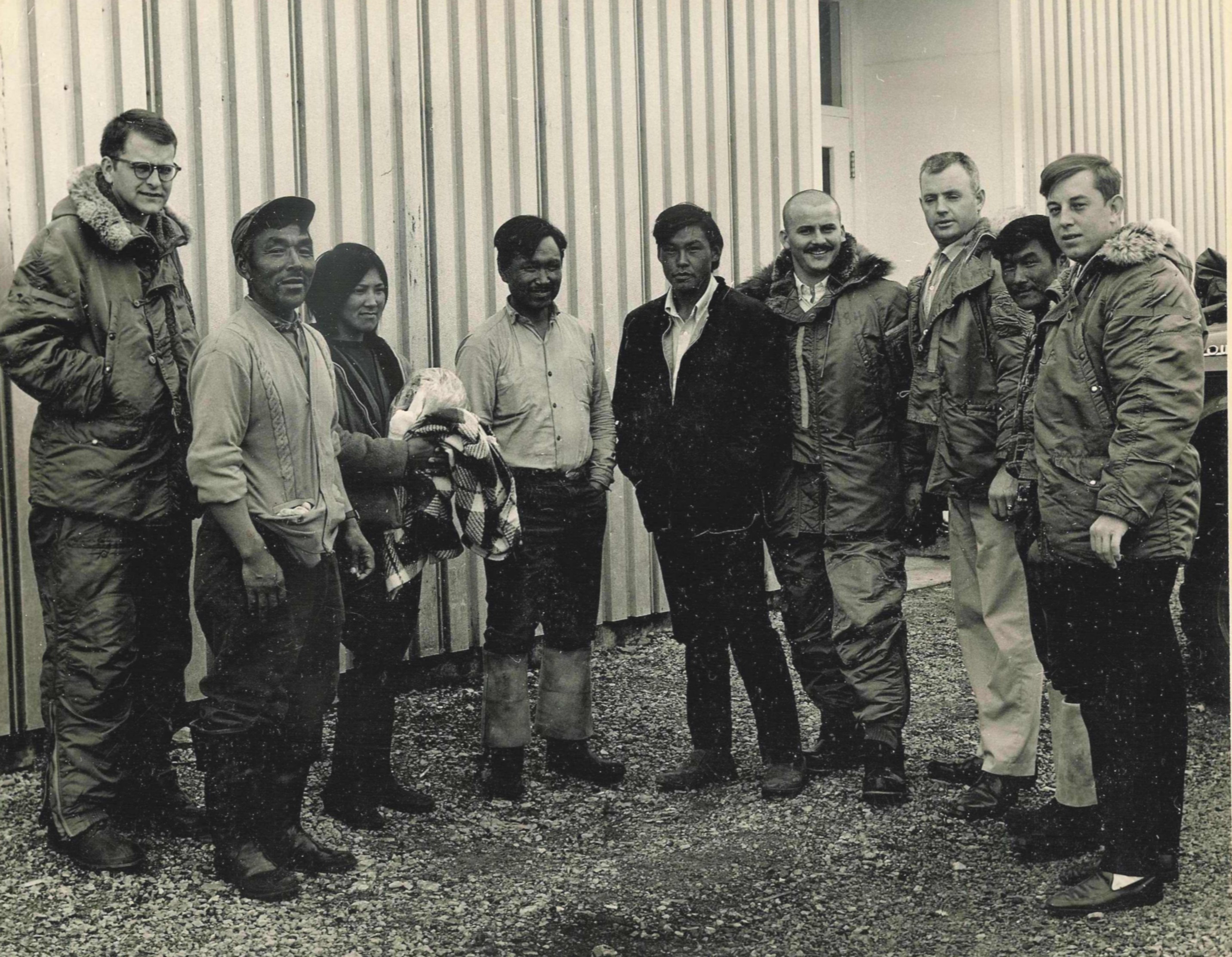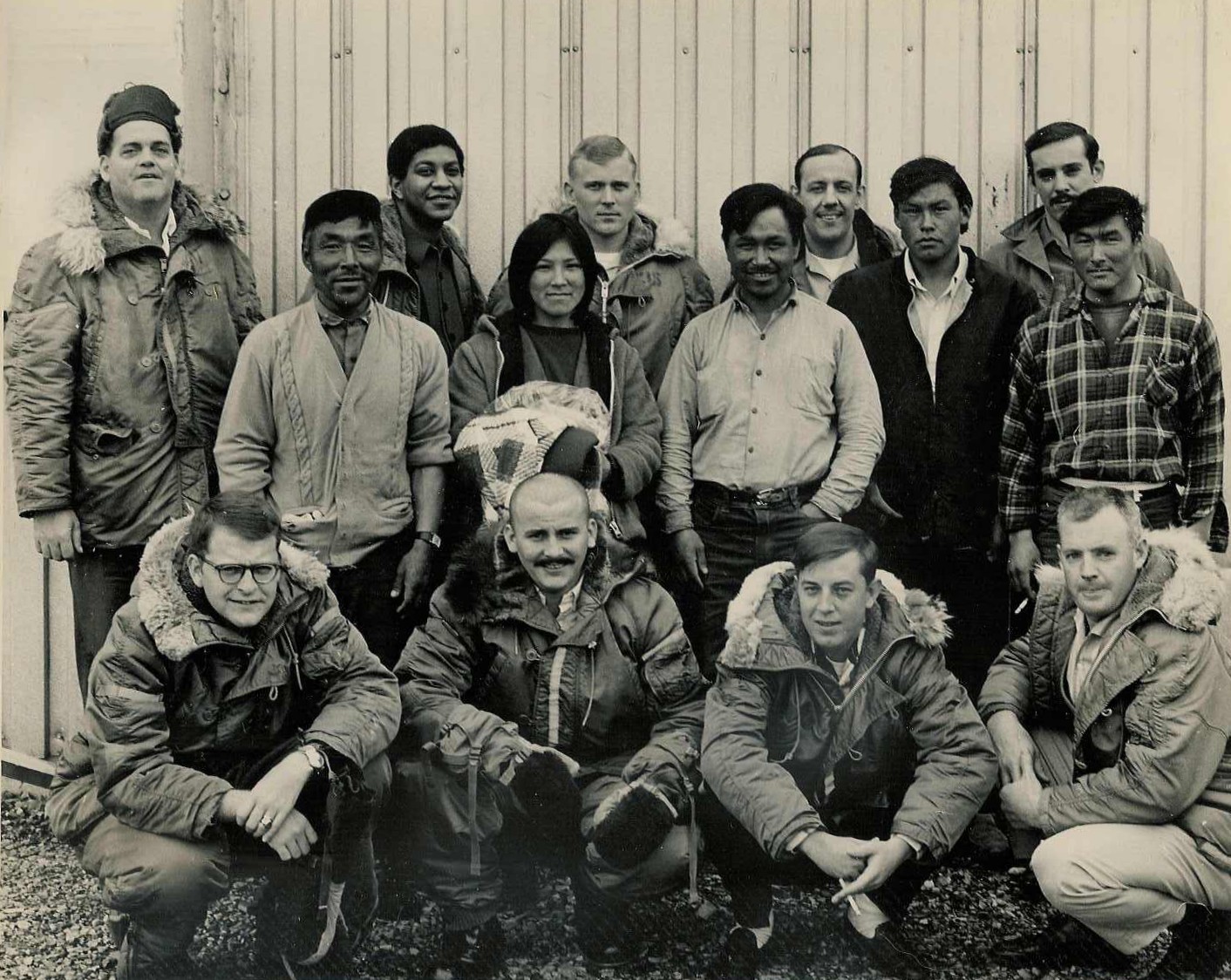Caught in a storm - July 4, 1969
This account and pictures were provided by Dennis Stanley and are used on this website with his permission.

On or about the 4th of July 1969, Sgt. Bob Martin, civilian Don Pelley and I decided to take a camping and fishing excursion during the holiday. Martin and myself wore street clothes and field jackets (no liners) while Pelley wisely wore a parka. We were equipped with fishing gear, sleeping bags, a two-man pup tent and a little food, along with a few cans of Sterno. We were totally unprepared for what we faced.
During the afternoon, we spotted a fishing boat entering a small inlet. We knew it must belong to Inuit coming north for fishing. We signaled them with the smoke of a small fire to make them aware that we were in the area.
After setting up camp on soft Caribou moss, we were surprised when Sgt, Steve Thompson, a new arrival that very day, wandered into our camp, alone and unsure of how to return to the squadron. We told him it wasn't wise to start back alone and told him to camp with us. Thompson was my replacement in radio maintenance. Sometime in the night, a herd of Caribou passed by our camp.
Early next morning, Martin rousted me from sleep to tell me it was raining and crowd (sic) into the tent. The wind began to increase and the rain became heavy sleet, then snow. The tent collapsed on us and the soft Caribou moss became like a sponge. We were then lying in about two inches of water, with the temperature dropping.
It continued to alternate between snow and rain throughout the morning as the wind increased and the temperature continued to fall. Snowfall increased as did the wind until we were in a whiteout situation. We considered starting back to the squadron. I didn't think we could make it what with our clothes soaked, the wind constant and increasingly stronger and everything we had to walk over was now iced over. On the way, there were streams rushing down gullies that were snow-packed several feet above the water flow and (a) small but wide stream flowing among boulders were we had to jump one-to-another in order to cross the stream. It made for a freezing-cold night. Wind speed we estimated to be 50-60 mph with gusts nearing 80 mph.
The next day, we were getting worried. Our strength was waning, our clothes partly frozen, extremities becoming increasingly numb, and hallucinations were beginning to occur. We decided that one of us had to seek help from the Inuits. I was going to attempt to go to their camp but I could not feel my feet to put on my boots. Mr. Pelley volunteered to go. An hour later, I was asking where Don was, as I awoke from a short sleep. I never did recall his leaving. I awoke once to find my ear to be covered with ice.
The Inuit camp, we estimated to be close to half of a mile distant across a rock-strewn hill. Mr. Pelley said that he ran and walked, stomping on every rock in his path to retain feeling in his feet. Around five hours after leaving us, Mr. Pelley returned in the company of Tom Okkuatsiak, the elder of the fishing party and three or four other men to rescue us.
The Inuits lost an 18 ft. tent to the storm. The NCO Club and I split the cost of a replacement tent we had flown in from the Hudson Bay Company to show our gratitude for the rescue and their hospitality.

Back Row: (L. to R.): George Hiscock (Guide), SSgt Scott (Scotty), Capt. Chuck Wornom (OIC), MSgt Mort Warren (NCO Club Manager & OPS), Sgt Ricciutti (Orderly Room)
Middle Row : Tom Okkuatsiak (Patriarch), Mary Okkuatsiak (Interpreter), Jacko Obed, Coas Millie, John Okkuatsiak.
Front Row: Sgt Dennis Stanley (Radio Maint.), Sgt Bob Martin (Wire Maint.), Sgt Steve Thompson (Radio Maint), Don Pelley (Civilian).
Dennis Stanley would like to hear from other people who remember or who participated in any way in this incident. I will pass on any messages that are directed to me at the email address in the page footer below.
Mary Atkinson (Mary Okkuatsiak in this story) reonnected with Dennis Stanley shortly before she died in 2009.